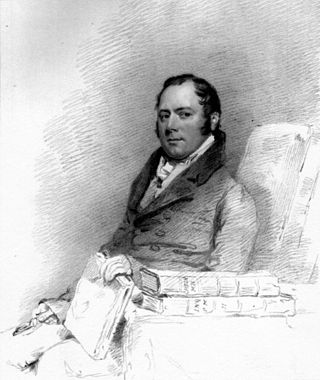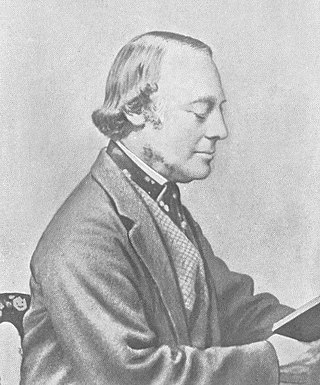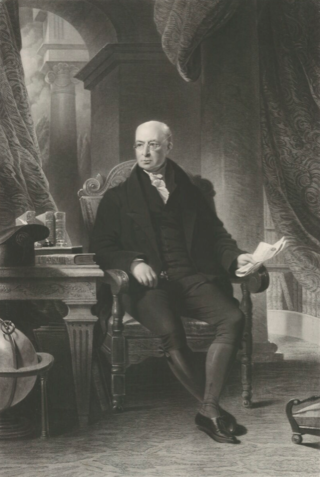Related Research Articles

William Stubbs was an English historian and Anglican bishop. He was Regius Professor of Modern History at the University of Oxford between 1866 and 1884. He was Bishop of Chester from 1884 to 1889 and Bishop of Oxford from 1889 to 1901.

Heraldic visitations were tours of inspection undertaken by Kings of Arms throughout England, Wales and Ireland. Their purpose was to register and regulate the coats of arms of nobility, gentry and boroughs, and to record pedigrees. They took place from 1530 to 1688, and their records provide important source material for historians and genealogists.

George Ormerod was an English antiquary and historian. Among his writings was a major county history of Cheshire, in North West England.

Sir Stephen Richard Glynne, 9th Baronet was a Welsh landowner and Conservative Party politician. He is principally remembered as an assiduous antiquary and student of British church architecture. He was a brother-in-law of the Liberal Prime Minister William Ewart Gladstone.
Thomas Corser was a British literary scholar and Church of England clergyman. He was the editor of Collectanea Anglo-Poetica.
James Crossley FSA was an English lawyer, author, bibliophile and literary scholar who was President of the Chetham Society from 1847 to 1883 and President of the Record Society of Lancashire and Cheshire from 1878 to 1883.
The timeline of Cheshire history shows significant events in the history of the English county of Cheshire.
The Lancashire and Cheshire Antiquarian Society is a historical society and registered charity founded, on 21 March 1883, for the study of any aspects of the area covered by the Palatine Counties of Lancashire and Cheshire from antiquity to the twenty-first century.
The Lancashire Parish Register Society is a text publication society and registered charity which was founded for the "purpose of printing the registers of the ancient parishes" in Lancashire and has published more than 175 volumes, CDs and CD-Roms since 1898.
The Historic Society of Lancashire and Cheshire is a historical society and registered charity founded for the purpose of "collecting, preserving, arranging and publishing such Historical Documents, Antiquities…Specimens of Ancient and Medieval Art, etc. as are connected with the Counties Palatine of Lancaster and Chester…" on 20 June 1848. The society became a registered charity in 1964.

John Eglington Bailey (1840–1888) was an English antiquary, Secretary of the Chetham Society and Fellow of the Society of Antiquaries.

John Parsons Earwaker (1847–1895) was an English antiquary.
Paul Howson William Booth is a British medieval historian and teacher, specialising in the history of Cheshire in the thirteenth and fourteenth centuries, and local history of the North West. Booth is an Honorary Senior Research Fellow of the University of Keele, having previously held the same honour at the University of Liverpool from 2010 to 2012.

William Langton was an English banker in Manchester, known also for antiquarian and philanthropic interests.
Thomas Heywood (1797–1866) was an English antiquarian. He was closely involved in the Chetham Society and its publications.
The Record Society of Lancashire and Cheshire is a text publication society that publishes historical documents relating to the traditional counties of Lancashire and Cheshire. It became a registered charity for public education in the history of the two counties in 1970.

William Robert Hay (1761–1839) was a British barrister, cleric and magistrate, one of the Manchester group associated with the Peterloo Massacre.
John William Robinson Parker was a British soldier, antiquarian, owner of Browsholme Hall and Honorary Bowbearer of the Forest of Bowland, Lancashire.
William Henry Chaloner was an English social and economic historian who was Editor and Treasurer of the Chetham Society and Editor of the Lancashire and Cheshire Antiquarian Society.
William Ecroyd Farrer was an English historian and genealogist.
References
Citations
- ↑ "About Us – The Chetham Society" . Retrieved 20 August 2022.
- ↑ "About Us – The Chetham Society" . Retrieved 20 August 2022.
- ↑ "Charity Commission of England and Wales", Charity Commission of England and Wales, 11 December 2013, retrieved 11 December 2013
- ↑ Levine (2003), p. 42
- ↑ Hawkins (1844)
- ↑ "Chetham Society: Officers and Council" (PDF), Chetham Society, 4 November 2015, archived from the original (PDF) on 17 November 2015, retrieved 4 November 2015
- ↑ "The Chetham Society – The Chetham Society publish major works of scholarship on the history of the palatine counties of Lancashire and Chester" . Retrieved 20 August 2022.
- ↑ "Publications – The Chetham Society" . Retrieved 20 August 2022.
- ↑ "Old Series – The Chetham Society" . Retrieved 20 August 2022.
- ↑ "New Series – The Chetham Society" . Retrieved 20 August 2022.
- ↑ "Third Series – The Chetham Society" . Retrieved 20 August 2022.
Bibliography
- Levine, Philippa (2003), The Amateur and the Professional: Antiquarians, Historians and Archaeologists in Victorian England, 1838–1886, Cambridge University Press, ISBN 978-0-521-53050-7
- Hawkins, Edward (1844), Travels in Holland, the United Provinces, England, Scotland, and Ireland, 1634–5 by Sir William Brereton, Bart., Chetham Society, O.S., vol. 1
